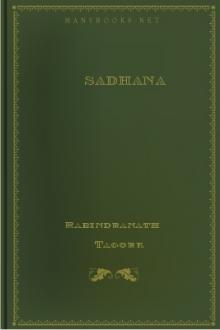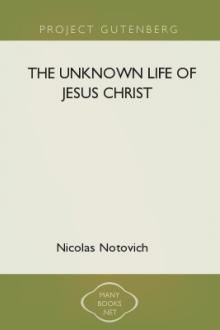Sadhana - Rabindranath Tagore (book club suggestions txt) 📗

- Author: Rabindranath Tagore
- Performer: -
Book online «Sadhana - Rabindranath Tagore (book club suggestions txt) 📗». Author Rabindranath Tagore
Not only in our self but also in nature is there this separateness from God, which has been described as maya by our philosophers, because the separateness does not exist by itself, it does not limit God’s infinity from outside. It is his own will that has imposed limits to itself, just as the chess-player restricts his will with regard to the moving of the chessmen.
The player willingly enters into definite relations with each particular piece and realises the joy of his power by these very restrictions. It is not that he cannot move the chessmen just as he pleases, but if he does so then there can be no play. If God assumes his role of omnipotence, then his creation is at an end and his power loses all its meaning. For power to be a power must act within limits. God’s water must be water, his earth can never be other than earth. The law that has made them water and earth is his own law by which he has separated the play from the player, for therein the joy of the player consists.
As by the limits of law nature is separated from God, so it is the limits of its egoism which separates the self from him. He has willingly set limits to his will, and has given us mastery over the little world of our own. It is like a father’s settling upon his son some allowance within the limit of which he is free to do what he likes. Though it remains a portion of the father’s own property, yet he frees it from the operation of his own will.
The reason of it is that the will, which is love’s will and therefore free, can have its joy only in a union with another free will. The tyrant who must have slaves looks upon them as instruments of his purpose. It is the consciousness of his own necessity which makes him crush the will out of them, to make his self-interest absolutely secure. This self-interest cannot brook the least freedom in others, because it is not itself free. The tyrant is really dependent on his slaves, and therefore he tries to make them completely useful by making them subservient to his own will. But a lover must have two wills for the realisation of his love, because the consummation of love is in harmony, the harmony between freedom and freedom. So God’s love from which our self has taken form has made it separate from God; and it is God’s love which again establishes a reconciliation and unites God with our self through the separation. That is why our self has to go through endless renewals. For in its career of separateness it cannot go on for ever. Separateness is the finitude where it finds its barriers to come back again and again to its infinite source. Our self has ceaselessly to cast off its age, repeatedly shed its limits in oblivion and death, in order to realise its immortal youth. Its personality must merge in the universal time after time, in fact pass through it every moment, ever to refresh its individual life. It must follow the eternal rhythm and touch the fundamental unity at every step, and thus maintain its separation balanced in beauty and strength.
The play of life and death we see everywhere—this transmutation of the old into the new. The day comes to us every morning, naked and white, fresh as a flower. But we know it is old. It is age itself. It is that very ancient day which took up the newborn earth in its arms, covered it with its white mantle of light, and sent it forth on its pilgrimage among the stars.
Yet its feet are untired and its eyes undimmed. It carries the golden amulet of ageless eternity, at whose touch all wrinkles vanish from the forehead of creation. In the very core of the world’s heart stands immortal youth. Death and decay cast over its face momentary shadows and pass on; they leave no marks of their steps—and truth remains fresh and young.
This old, old day of our earth is born again and again every morning. It comes back to the original refrain of its music. If its march were the march of an infinite straight line, if it had not the awful pause of its plunge in the abysmal darkness and its repeated rebirth in the life of the endless beginning, then it would gradually soil and bury truth with its dust and spread ceaseless aching over the earth under its heavy tread. Then every moment would leave its load of weariness behind, and decrepitude would reign supreme on its throne of eternal dirt.
But every morning the day is reborn among the newly-blossomed flowers with the same message retold and the same assurance renewed that death eternally dies, that the waves of turmoil are on the surface, and that the sea of tranquillity is fathomless.
The curtain of night is drawn aside and truth emerges without a speck of dust on its garment, without a furrow of age on its lineaments.
We see that he who is before everything else is the same to-day.
Every note of the song of creation comes fresh from his voice.
The universe is not a mere echo, reverberating from sky to sky, like a homeless wanderer—the echo of an old song sung once for all in the dim beginning of things and then left orphaned. Every moment it comes from the heart of the master, it is breathed in his breath.
And that is the reason why it overspreads the sky like a thought taking shape in a poem, and never has to break into pieces with the burden of its own accumulating weight. Hence the surprise of endless variations, the advent of the unaccountable, the ceaseless procession of individuals, each of whom is without a parallel in creation. As at the first so to the last, the beginning never ends—the world is ever old and ever new.
It is for our self to know that it must be born anew every moment of its life. It must break through all illusions that encase it in their crust to make it appear old, burdening it with death.
For life is immortal youthfulness, and it hates age that tries to clog its movements—age that belongs not to life in truth, but follows it as the shadow follows the lamp.
Our life, like a river, strikes its banks not to find itself closed in by them, but to realise anew every moment that it has its unending opening towards the sea. It is a poem that strikes its metre at every step not to be silenced by its rigid regulations, but to give expression every moment to the inner freedom of its harmony.
The boundary walls of our individuality thrust us back within our limits, on the one hand, and thus lead us, on the other, to the unlimited. Only when we try to make these limits infinite are we launched into an impossible contradiction and court miserable failure.
This is the cause which leads to the great revolutions in human history. Whenever the part, spurning the whole, tries to run a separate course of its own, the great pull of the all gives it a violent wrench, stops it suddenly, and brings it to the dust.
Whenever the individual tries to dam the ever-flowing current of the world-force and imprison it within the area of his particular use, it brings on disaster. However powerful a king may be, he cannot raise his standard or rebellion against the infinite source of strength, which is unity, and yet remain powerful.
It has been said, By unrighteousness men prosper, gain what they desire, and triumph over their enemies, but at the end they are cut off at the root and suffer extinction. [Footnote: Adharmenaidhate tavat tato bahdrani pacyati tatah sapatnan jayati samulastu vinacyati.] Our roots must go deep down into the universal if we would attain the greatness of personality.
It is the end of our self to seek that union. It must bend its head low in love and meekness and take its stand where great and small all meet. It has to gain by its loss and rise by its surrender. His games would be a horror to the child if he could not come back to his mother, and our pride of personality will be a curse to us if we cannot give it up in love. We must know that it is only the revelation of the Infinite which is endlessly new and eternally beautiful in us, and which gives the only meaning to our self.
V REALISATION IN LOVEWe come now to the eternal problem of co-existence of the infinite and the finite, of the supreme being and our soul.
There is a sublime paradox that lies at the root of existence.
We never can go round it, because we never can stand outside the problem and weigh it against any other possible alternative. But the problem exists in logic only; in reality it does not offer us any difficulty at all. Logically speaking, the distance between two points, however near, may be said to be infinite because it is infinitely divisible. But we do cross the infinite at every step, and meet the eternal in every second. Therefore some of our philosophers say there is no such thing as finitude; it is but a maya, an illusion. The real is the infinite, and it is only maya, the unreality, which causes the appearance of the finite.
But the word maya is a mere name, it is no explanation. It is merely saying that with truth there is this appearance which is the opposite of truth; but how they come to exist at one and the same time is incomprehensible.
We have what we call in Sanskrit dvandva, a series of opposites in creation; such as, the positive pole and the negative, the centripetal force and the centrifugal, attraction and repulsion.
These are also mere names, they are no explanations. They are only different ways of asserting that the world in its essence is a reconciliation of pairs of opposing forces. These forces, like the left and the right hands of the creator, are acting in absolute harmony, yet acting from opposite directions.
There is a bond of harmony between our two eyes, which makes them act in unison. Likewise there is an unbreakable continuity of relation in the physical world between heat and cold, light and darkness, motion and rest, as between the bass and treble notes of a piano. That is why these opposites do not bring confusion in the universe, but harmony. If creation were but a chaos, we should have to imagine the two opposing principles as trying to get the better of each other. But the universe is not under martial law, arbitrary and provisional. Here we find no force which can run amok, or go on indefinitely in its wild road, like an exiled outlaw, breaking all harmony with its surroundings; each force, on the contrary, has to come back in a curved line





Comments (0)